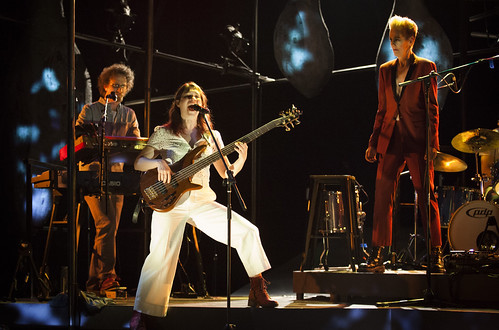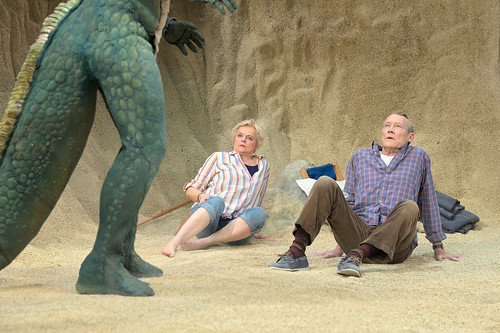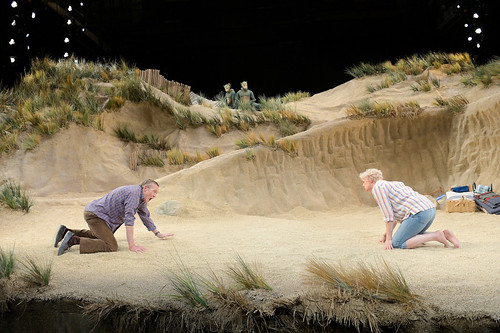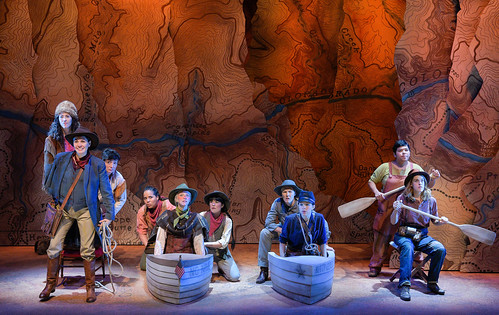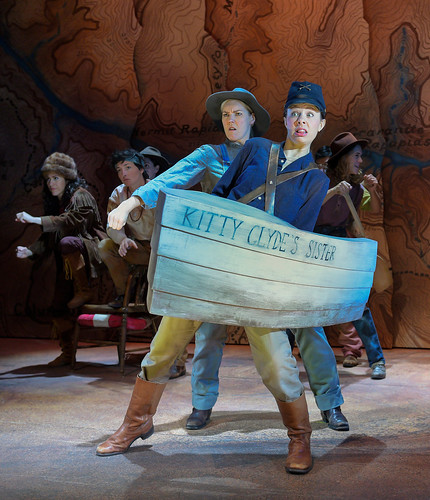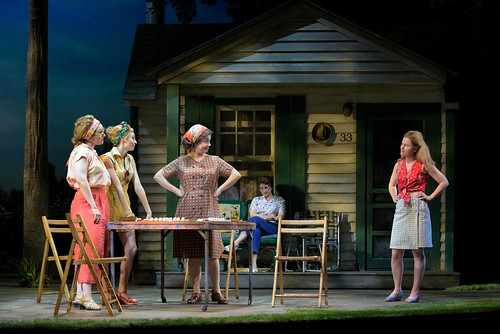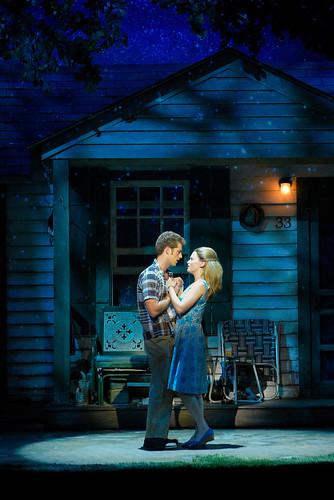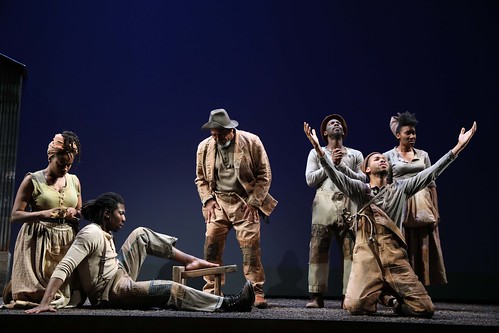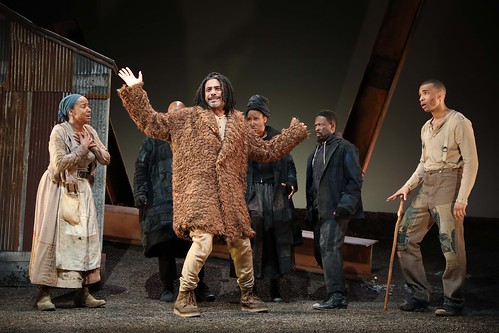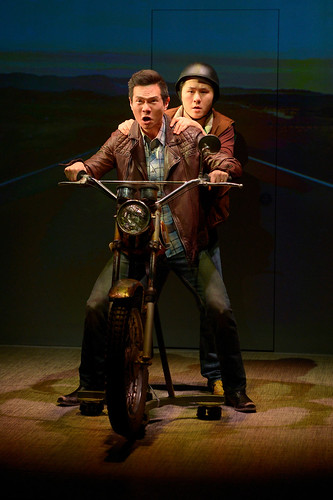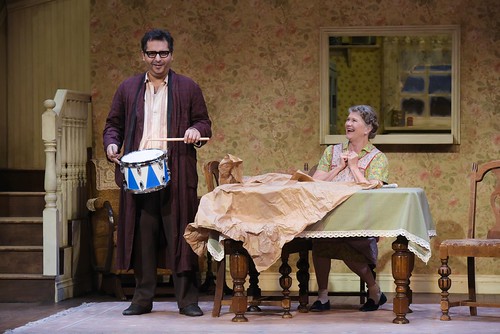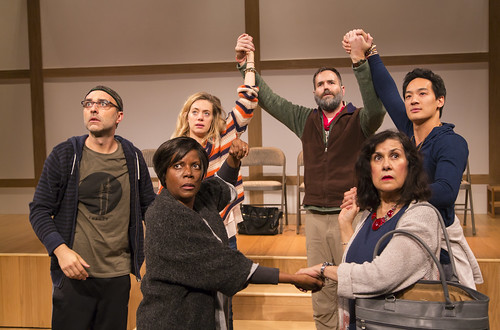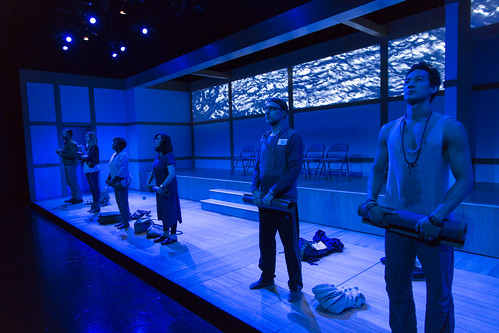
Kate Kilbane (left) and Lila Blue in the rock musical Weightless at ACT’s The Strand. Below: Dan Moses, Kilbane and Brothers bring the story of sisters Procne and Philomela to musical life. Photos by Julie Schuchard
Last year I fell in love with Weightless, the rock musical by The Kilbanes, when it had a triumphant world premiere at Z Space. The show had muscle and heart and passion and staggering beauty. The experience of watching the show was so thrilling it felt like something important was beginning – a new hit musical on its way along the lines of Hadestown or Once but on a slightly different scale, one that finds an intriguing balance between rock concert and rock musical.
(Read my original review here.)
Weightless may yet become the massive hit it so richly deserves to be. A year later, the show is back in San Francisco, this time at American Conservatory Theater’s Strand Theater for a quick two-week run. It’s the same glorious cast/band – the wife-and-husband team of Kate Kilbane and Dan Moses, Lila Blue, Julia Brothers, Josh Pollock and Dan Harris – and the same creative team headed by director Becca Wolff. The biggest difference is that the show has moved from the customized performance space that the marvelously malleable Z Space affords, with audience on three sides of the stage and into a more traditional proscenium situation.
Happily, the Strand is so intimate that very little is lost in transition. The design elements – primarily the gourd-shaped objects of Angrette McCloskey’s set design that hover of the stage are even more effective at catching the lights (by Ray Oppenheimer and the dynamic projection designs (by Hana S. Kim). The nuances of the performances, especially Brothers who plays God in such a way that if I ever find out such a deity exists and it’s not in the image of Brothers channeling David Bowie, I’m going to be shatteringly disappointed. I felt like this time I heard and absorbed more of the score and the story, making it that much more exciting and moving.
And what a story. Inspired by Ovid’s Metamorphoses, Weightless tells the story of inseparable sisters Procne (Kilbane) and Philomela (Blue) and how their love and devotion to one another is threatened and nearly destroyed by a man, Tereus (Pollock). There are lies, betrayals and excruciating violence. There is ferocious anger and revenge. And there is transcendent beauty – all set to a dynamic, heart-grabbing score that combines rock, pop, folk and anything else that sounds good.
Kilbane and Pollock danced the most delicate dance because they have to be raging rock stars – she on bass, he on lead guitar – and deliver high-voltage dramatic performances. Both are tremendous. Blue remains as stunning and as ethereal as ever. Her Philomela hardly seems of this earth. The character is transformed by art and nature even before God interferes and takes that transformation to a whole different level, and her voice ranges from deeply emotional to realms of beauty we are rarely allowed to visit. Every time she and Kilbane combine their voices, it’s like Weightless jolted by bolts of lightning from Mt. Olympus. And I would posit that the driving “Awake” is as exciting as any musical theater moment currently on any stage right now.
As enjoyable as Weightless is, it also has heft. The canny re-crafting of Ovid’s story (which is far more violent and grotesque) allows for more beauty in the telling and makes a strong case for beauty in art and nature being – along with earth, wind, fire and water – one of the essential elements of life. There is also joy, plain and simple joy, in being told a fascinating story with clear characters, tension and outcomes. The fact that much of the story is narrated by one of the few gods that still cares about humans makes it even more poignant. Somebody really is listening. Maybe.
It’s so heartening to revisit a beloved work and find it not only as good as you remembered but maybe even better. Oh, Weightless, to paraphrase you: your heart and your bones, your heart is my home.
FOR MORE INFORMATION
The Kilbanes’ Weightless continues through May 12 at ACT’s The Strand, 1127 Market St., San Francisco. Tickets are $15-$65. Call 415-749-2228 or visit act-sf.org.

